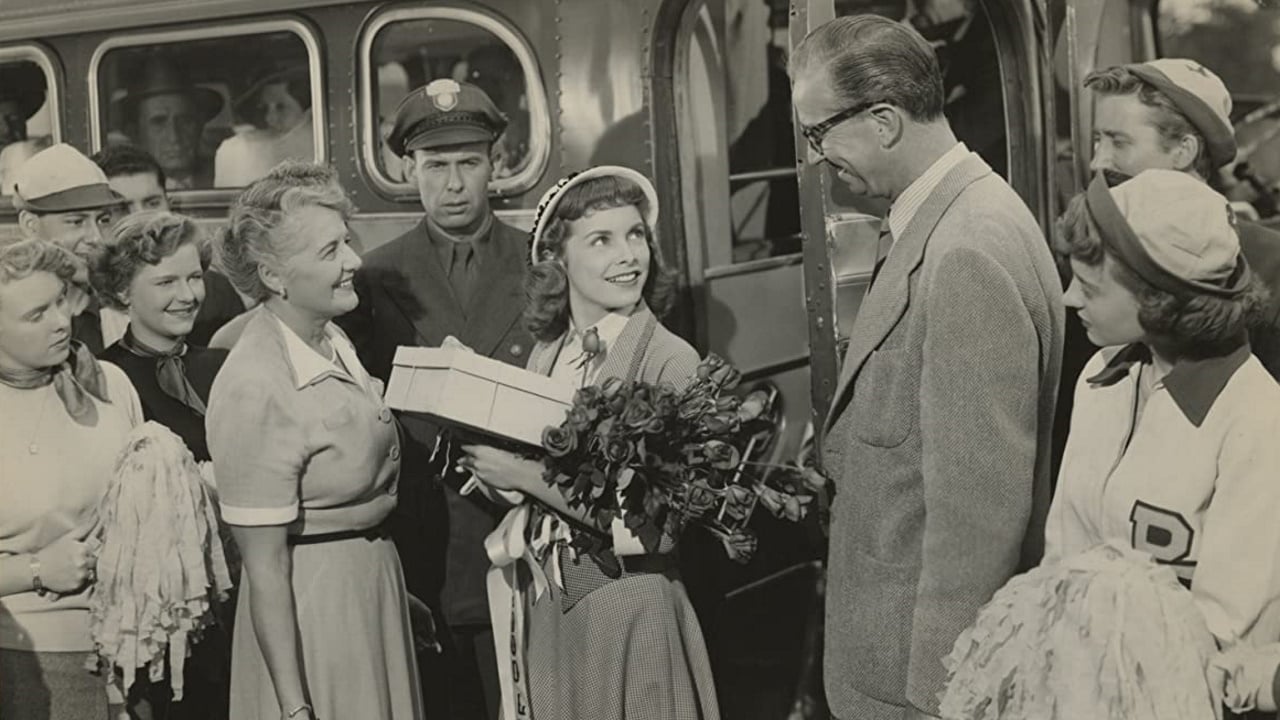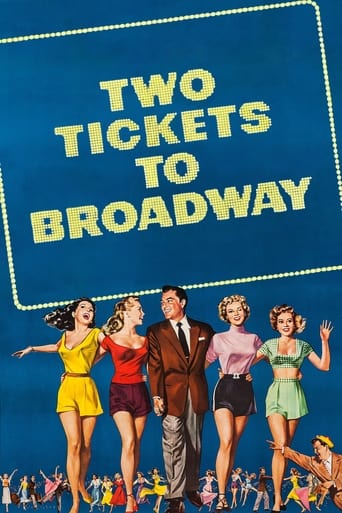

Although it has its amusing moments, in eneral the plot does not convince.
... View MoreI wanted to like it more than I actually did... But much of the humor totally escaped me and I walked out only mildly impressed.
... View MoreYour blood may run cold, but you now find yourself pinioned to the story.
... View MoreAfter playing with our expectations, this turns out to be a very different sort of film.
... View MoreHoward Hughes's line up of acts is basically his way of responding to the other studios' efforts to do the same thing. There are echoes of the Garland/Rooney cycle of musicals from MGM, with a spice of Fox glitz and the good ol' feelin' of well-being from Warners' Doris Day vehicles of a similar period.The only snag is that Hughes did really have any big stars on his payroll. What TWO TICKETS TO Broadway presents is a panoply of would-be leading lights, youngsters on their way to stardom, and imitations of more famous originals such as Bob Crosby who does a specialty number with a cardboard cutout of his more illustrious sibling Bing.Having said that, some of the cast give winning turns. The triumvirate of Janet Leigh, Ann Miller and Gloria DeHaven adumbrate a similar conception in Fox's GENTLEMEN PREFER BLONDES (1953); and they acquit themselves thoroughly well in the song and dance sequences, with Miller getting the chance to show off her famed legs. Tony Martin croons his way through one or two numbers, to the delights of hordes of adoring bobbysoxers. Eddie Bracken camps it up in a largely extraneous comedy role.Yet perhaps the most interesting aspect of James V. Kern's all-star line-up is its inherent structural contradiction that tells us a lot about the contradictions of movie capitalism at the time. The film begins in Garland/ Rooney fashion by suggesting that, given time and talent, anyone can make it big so long as they have the drive and energy to do so, even if they originate from small-town and America and have to travel to New York by Greyhound bus. This is precisely what Leigh, DeHaven and Miller try to do.Yet once they get there, they find that they are very much at the agents' and radio program-makers' mercy. They have to alter their work to suit specific formats, and compromise at every opportunity in line with their employers' requirements. We wonder at this point whether Broadway - like Hollywood - actually values originality, or whether or not both institutions would be much happier with carbon copies of tried and tested formulas.The film does not attempt to answer the question, of course (why should it, when it was planned as a joyful musical), but it reveals an undercurrent of cynicism about the potentially adverse effects of money-making and success.
... View MoreI'm a sucker for Tony Martin's singing, so I watched this. It stars Martin and some lovely stars: Ann Miller, Gloria DeHaven, Barbara Lawrence, and Janet Leigh. Leigh was the fresh-faced, pretty, vivacious discovery of Norma Shearer. She was a natural.The film also features Eddie Bracken, Bob Crosby, plus Charles Dale and Joe Smith (in roles intended for Laurel and Hardy).Despite this cast and some humorous and romantic moments, this isn't a great musical. The songs are very uninspired. Tony Martin is described in this film as a baritone. You classify singers by sound and not range, and he sounds for all the world like a tenor to me. In fact, the Prologue from Pagliacci, sung by Tonio, a baritone, was low for him, and demonstrates that the beauty of his voice was in the upper range. Compare his voice to Nelson Eddy's, a true baritone.Leigh plays Nancy Peterson, the star of her home town who leaves to become a Broadway star. She meets three hungry, out of work showgirls: Hannah, Foxy, and Joyce (DeHaven, Lawrence, and Miller) whose show just closed and whose agent did not send them money to return to New York.The agent is Lew (Bracken), who is as low level in the agency world as you can get. He lies like a rug and has been promising his great talent, Dan Carter (Martin) a big job. His last lie gets him into big trouble. He has a supposed rep from Crosby tell Dan that he needs to put together an act, and then Crosby will feature him on his television show.Lew convinces the deli owners (Dale and Smith) to finance this big act. Of course rehearsals are interminable; Lew has no place to put it.Everyone is good. Barbara Lawrence was a highly touted actress who never achieved stardom; she's mentioned throughout the film "The Star" but no matter what they put her in or how often they mentioned her, the public never was attached to her.Miller, of course, was a tremendous tapper and featured in some great films. She almost seems to be slumming here.DeHaven, who used to live where I'm from with her then-husband, car dealer Richard Fincher, (she married him twice), was beautiful and a good performer. She did everything - Broadway, theater, movies, TV, hosting, game shows. Today she is 90 and one of the last living actresses from the golden age. There must be something in the water here because the city's men attract film stars. Ingrid Bergman lived here also with her husband, Dr. Lindstrom.Martin sang beautifully, as he always did, but I could have used better music.Leigh was very vibrant, and if her dancing wasn't perfect, she was a delight and sang well. A perfect ingénue.The color in this film is so garish it's not funny. Someone said Howard Hughes knew what he was doing - I frankly don't think he knew much about making movies. He knew a good-looking woman when he saw one, and he had knowledge of airplanes. Irving Thalberg he wasn't.
... View MorePelican Falls Vermont seems to have a pride that surpasses Broadway conventions. The town band seems to think that they can interrupt the Bob Crosby Show on television (without being stopped by security) to honor through their silly high school sing one of their own who just half an hour was ready to give up her dream for Broadway success. She's Janet Leigh, playing a former majorette named Nancy who just months before got a huge send-off from the same band and chorus who rhymed "Mary Martin" with "Kindergarden" and "Merman" (as in Ethel) with "German".Ironically, the composer of that song was Jule Styne who later wrote a few songs for Ms. Martin for "Peter Pan", and of course, wrote the music for Merman's final Broadway smash, "Gypsy". This Broadway of two male vaudeville performers (Smith and Dale) who run a delicatessen and argue like an old married couple has chorus girls returning from an out of town engagement on a show boat (which sunk) and a hotel for women in show business where the ladies act out a day in the city to the tune of Rodgers and Hart's "Manhattan" (which includes, ironically, new lyrics mentioning Rodgers and Hammerstein's "South Pacific"). Any comparison between this and even early 1950's Broadway reality as as close to life as Disney is.The musical numbers range from corny but fun ("The Worry Bird") to downright tacky ("Petrolium"). Ann Miller gets to do her traditional tap-and-twirl, while Gloria DeHaven is a bit less dainty than normal as the girlfriend of sleazy agent Eddie Bracken who lies to singer Tony Martin and the other girls about getting them a gig on the Bob Crosby television show. Barbara Lawrence, the fourth member of the team, has no other purpose than to fill out the female foursome. Pretty Technicolor is a major plus, although the television show finale, which would be black and white on the air, seems far too lavish for an early network variety show. Bob Crosby's spoof of brother Bing ("Let's Make Comparisons") is a wonderful novelty number, and a humorous acrobatic sketch is another highlight. Ironically, like the Russian ballet in "Bye Bye Birdie" (starring Ms. Leigh"), the acrobatic number is victim to foul play by Bracken so the group can get on the air without having to wait a week.
... View MoreFirst of all, to those upset about the Indian number - get a life. This was '51. Don't take it so seriously - and keep away from pictures with Mantan Moreland, etc.Then there are the criticisms about Tony Martin. He has the dark look, so some people automatically assume he should portray gangsters. Prejudice, prejudice against dark-haired people. Tsk.Martin sang grand opera in this movie, pop songs, novelties and did beautifully with all of them. Not all of the music was memorable, but even the songs that might be described as mediocre were beautifully presented. The girls were attractive and personable. Miss Leigh was a doll and, yes, she did her own singing and dancing.No one can knock Ann Miller. What a great talent. Speaking of talent, The Charlivels were outstanding as a high wire act, and as dancers.Interesting casting was Max Baer's bro, Buddy, also a boxer, as a tough swabbie.The Bob Crosby number, where he compares himself with brother Bing was very well done - real life situation. The one thing I missed - I wish his band had played some of its trademark Dixieland. OOoops - is that word offensive to northern ears? The plot was ancient but, who cares. Howard Hughes put this together and came up with a fun, pleasant movies.
... View More